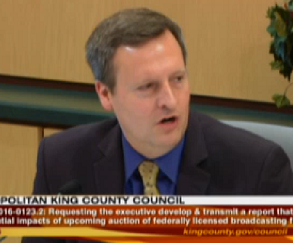Community Concerned About Spectrum Auction Impact

The smarter way to stay on top of broadcasting and cable industry. Sign up below
You are now subscribed
Your newsletter sign-up was successful
The King County [Washington] Council voted 9-0 this week to commission a study/investigation on the impact of the upcoming spectrum auction. According to a union representing broadcasters, if the results aren’t good, there could be a lobbying effort in Washington to try and slow the auction.
The council is cutting it close. The report is due back by March 25, according to Dave Twedell of IATSE Local 600, a union whose members include broadcasters and one of several unions—including the AFL-CIO, and IBEW--pushing for a hard look at the auction's impact on public safety and the public interest. The auction starts March 29 unless stayed by a federal court.
Twedell said IATSE urged the vote and report, concerned that the auction could "literally destroy television as we know it."
"This legislation is the first local government pushback against the Spectrum Auction, and we expect more to come," Twedell bold Broadcasting & Cable.
“There’s also a fundamental values question at stake underlying all of this," council member Dave Upthegrove said at the hearing on the proposal. "Public assets should be utilized to the public benefit, he said, adding that there was also a fundamental values question. "I feel like it’s sort of the playground of the billionaires. Buying and selling things in the billion-dollar ranges that ultimately are public assets,” he said. He said he is worried that once the airwaves are handed off they are "lost forever."
Upthegrove introduced the study proposal, which he said was to raise public awareness about the auction.
"The auction is scheduled to begin on March 29 and concerned groups believe local stations like Seattle’s KING 5 are first in line to be auctioned off by greedy speculators," said the union in its release. "These stations are required by federal law to inform and educate the community over the public airwaves. That will all be gone when these broadcast frequencies are sold off to private businesses."
The smarter way to stay on top of broadcasting and cable industry. Sign up below
An IBEW union rep speaking at the council meeting before the vote said she represented workers at Seattle stations KING, KOMO, KIRO and KCTS. She said the auction would incentivize those stations to go off the air, to be replaced by cable or Internet companies with no regulatory or licensing obligations.
Another labor leader told the council that it was a case of companies selling off scarce public spectrum for private profit. She said the goal of the auction was not the public interest and that she was worried about hedge funds speculating in the licenses.
Twedell also spoke at the auction, pointing out they were having labor issues with Tegna, but said that was not why they were backing the study. He said he wanted the county to protect itself from a "stealth rip-off of a public asset."
He said when you need to know if it is safe to go to school, or go outside, or drink the water, you depend on local TV to tell you. The auction would be "throwing that away," he said.
Contributing editor John Eggerton has been an editor and/or writer on media regulation, legislation and policy for over four decades, including covering the FCC, FTC, Congress, the major media trade associations, and the federal courts. In addition to Multichannel News and Broadcasting + Cable, his work has appeared in Radio World, TV Technology, TV Fax, This Week in Consumer Electronics, Variety and the Encyclopedia Britannica.

